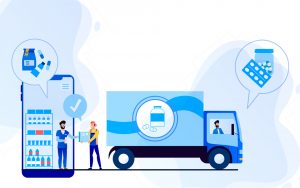As the digital healthcare market continues to expand at a staggering rate, many startups are looking for ways to stand out in the field. The key to this, as many are finding, may lie in creating a streamlined medication delivery platform for patients.
On a national level, super-retailers like Amazon, CVS, Walgreens, and Walmart have seen the profit potential of automated prescription delivery, with all of these corporations offering their own versions of online pharmacy services. Now, many smaller companies are rushing to zero in on the market before it is completely dominated by giants.
Ginger, a licensed medical provider for psychiatric and mental health services, is an example of this concept being put into play. The service has recently teamed up with Capsule, a medication-delivery startup, to offer patients same-day delivery options in New York, Chicago, Austin, Minneapolis, and Boston.
Capsule not only provides a direct platform for doctors to utilize in filling prescriptions, but also allows them to look at accumulated data of medication refill rates and self-analyze the risk and cost factors that prescriptions may have for patients. The long-term impact of such a technology could be a vital step in creating an evidence-based and consumer-focused plan for drug administration.
Similarly, Maven, a women’s and family health digital service, has announced that it will begin providing fertility drugs to its patients through the mail. MavenRx is a system put in place to not only aid in the delivery of fertility drugs, but also to guide patients in the self-administration of injections and offset the high costs of in-person fertility treatments.
The short-term results of moving into pharmaceutical delivery services are already becoming clear for many companies. Telehealth company Ro has been able to expand services to three online clinics since its initial push to begin administering some drugs to patients via mail service.
Time and data will eventually prove to be the key elements to expanding this realm of the digital healthcare industry, and as more companies get on board, consumers could see an increase in service efficiency and a decrease in cost for prescriptions as a result.























